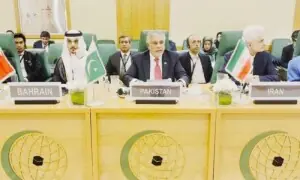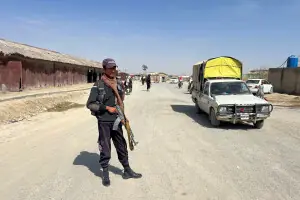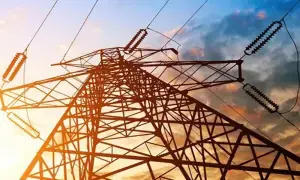Top oil producers agree modest supply boost amid demand concerns
3 min readBy Julia ZAPPEI with Emeline BURCKEL in London
VIENNA: Saudi Arabia, Russia and other key oil producers agreed Thursday on another marginal increase in output, bolstered by risks to demand amid coronavirus restrictions in China.
Russia’s invasion of Ukraine has added to supply concerns, which have increased with Europe’s announced moves on a potential Russian oil embargo.
OPEC+ members confirmed they’ll stick to their strategy of modestly boosting output, adding another 432,000 barrels per day for June.
In short back-to-back meetings via video conference, the group “noted the continuing effects of geopolitical factors and issues related to the ongoing pandemic”, it said in a press release.
Prices had soared on Wednesday, with the Brent North Sea contract closing above $110 a barrel, its highest level in two-and-a-half weeks.
At around 1400 GMT on Thursday, Brent stood at $113.25 a barrel and American WTI at $110.64 a barrel.
Inability to meet quotas
Analysts had widely expected the Organization of Petroleum Exporting Countries (OPEC), led by Riyadh, and their 10 partners led by Moscow to stay the course.
“In any case, the decision by OPEC+ to raise its output quota in June is only as relevant as its ability to meet that quota. In recent months, it has failed to do so,” Edward Gardner, a commodities economist for Capital Economics, said.
Between a lack of investment in oil infrastructure in some member countries and operational problems, the cartel regularly fails to meet its production quotas.
The cartel’s strategy dates back to the spring of 2021 when the economy began recovering and oil market stabilised after the drastic cuts imposed amid the shock of the pandemic.
Largely spared for two years, China in recent weeks has been battling its worst coronavirus outbreak since the spring of 2020 which has strained its zero-Covid strategy.
Beijing on Wednesday closed dozens of metro stations and residents fear their city will be locked down, as is already the case in Shanghai, the country’s largest city with 25 million people.
“The slowing activity in China is certainly a factor that will justify their decision to stay put, faced with the mounting international pressure to increase production to address the worsening global energy crisis,” Ipek Ozkardeskaya, an analyst at Swissquote bank, told AFP ahead of the meeting.
As for the new economic sanctions planned against Russia, they were also not expected to move the needle for the moment.
In its sixth package of sanctions, the European Commission is seeking a ban on all Russian crude oil and refined products transported by sea and pipeline by the end of 2022, European Commission President Ursula von der Leyen told the European Parliament.
‘Huge impact’
That prospect threatens supply in an already tense European market.
While unanimity among the 27 EU member states is required for the sanctions to go forward, Hungary, which is highly dependent on Russian deliveries, rejected the project in its current form.
“If it (the EU) manages to convince its members to ratify the plan… then this will have a huge impact on Russian oil exports,” Fawad Razaqzada, analyst at City Index and Forex.com, said ahead of the meeting.
Stephen Innes, an analyst at SPI Asset Management, said OPEC+’s wait-and-see approach was “increasingly untenable” and “contrary to its mission statement”.
“(It’s) why they have fallen under constant criticism for being slow and technically unprepared to react to recent developments in global markets,” he said.
For the latest news, follow us on Twitter @Aaj_Urdu. We are also on Facebook, Instagram and YouTube.



























Comments are closed on this story.